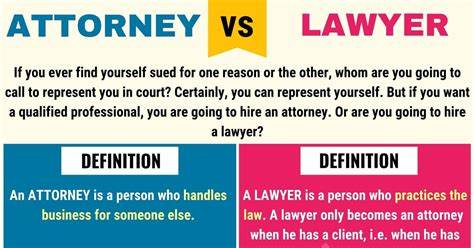“Attorney” vs. “Lawyer”: What’s The Difference?
The words lawyer and attorney are often used as general terms for a person who gives legal advice and aid and who conducts suits in court.
What’s the difference between an attorney and a lawyer?
The American Bar Association does not differentiate between a lawyer and attorney. The ABA uses these terms interchangeably to refer to a person who can practice law. The American Bar Association states on their website that “A lawyer (also called attorney, counsel, or counselor) is a licensed professional who advises and represents others in legal matters.”
However, some law offices may use the words attorney and lawyer to refer to people who have different responsibilities or specializations. For example, they may use the word attorney to describe a person whose typical work involves representing people in court and use the word lawyer to describe a person who does other kinds of legal work outside of the courtroom, such as offering legal advice or reviewing legal documents.
Sometimes, the word lawyer is also used more generally to refer to any person who has graduated from law school and earned a law degree. However, this usage does not agree with the ABA’s definition of a lawyer (or attorney). The ABA states that a person is not a lawyer until they have passed the state bar examination and have been licensed by a state to practice law.
Barristers vs. solicitors
In the UK, those who practice law are divided into barristers, who represent clients in open court and may appear at the bar, and solicitors, who are permitted to conduct litigation in court but not to plead cases in open court. Typically, barristers are hired by solicitors on behalf of a client.
What’s a counsel?
Counsel usually refers to a body of legal advisers but also pertains to a single legal adviser and is a synonym for advocate, barrister, counselor, and counselor-at-law.
As to the abbreviation Esq. for Esquire used by some lawyers, it has no precise significance in the United States except as sometimes applied to certain public officials, such as justices of the peace. For some reason, lawyers often add it to their surname in written address. However, it is a title that is specifically male with no female equivalent, so its use by lawyers is fading away.
What Is an Attorney?
Attorneys are qualified and licensed legal professionals that can provide legal advice, represent clients in court, and advocate on their clients’ behalf regarding legal matters.
To become an attorney, individuals must complete a Bachelor’s degree, complete law school, and pass the bar exam. While a Juris Doctor (JD) is a sufficient degree for an attorney, many attorneys continue on to pursue a Master of Law (LLM). As an attorney, you are a licensed legal practitioner with the ability to represent clients in court.
What Is a Lawyer?
Now that you have a better understanding of what an attorney does, you might still be wondering about the difference between an attorney and a lawyer.
Like attorneys, lawyers are required to complete their bachelor’s degree and obtain a JD. Lawyers do not necessarily need to pass the bar exam to use this title. Their primary roles encompass providing legal counsel, offering expertise on legal matters, and engaging in legal research and document drafting.
Lawyers may also negotiate on behalf of clients and represent them in court proceedings if they choose to take the bar exam or pursue a legal career path that requires such representation. Lawyers are integral to the legal system, offering essential guidance and expertise to individuals and organizations while navigating the complexities of the legal landscape.
Good judgment and decision-making skills, communication skills, leadership, and logical thinking skills are essential traits to make a good lawyer.
Attorney vs. Lawyer: Understanding the Differences
While both attorneys and lawyers practice in the field of law, and the distinction between the two can be minuscule and sometimes hard to grasp, it’s essential to understand the difference as you proceed with a career in law or even if you’re looking to find legal advice or representation.
In simplest terms, an attorney can also be called a lawyer, but a lawyer cannot always be called an attorney. In many cases, the two can be interchanged. However, it’s important to note that not all lawyers can be called attorneys.
Let’s break down three key differences below to further clarify the difference between an attorney vs. a lawyer.
Licensing
First and foremost, lawyers and attorneys have different qualifications. While we have mentioned this before, it’s essential to reiterate.
To become an attorney, you’re required to pass the bar exam and obtain a license to practice in their state. On the other hand, lawyers do not need to pass the bar, take the bar, or be licensed to practice.
Limitations of Legal Practice
The difference in licensing requirements is naturally accompanied by limitations in legal practice.
Attorneys can represent clients in a court of law and advocate on their behalf during hearings, negotiations, and other legal proceedings. They can also defend their client’s rights and actively seek and implement solutions for legal issues.
Attorneys are also able to draft and review documents such as contracts, wills, deeds, and pleadings. On the other hand, unlicensed lawyers (i.e., have not taken or passed the bar and are not licensed to practice) can only provide legal advice, assistance, and counseling. They are able to provide informed guidance–explaining a client’s rights and obligations and helping them understand the legal implications of certain actions or decisions.
While lawyers cannot represent clients, they can provide legal counsel through mediation and negotiation. Oftentimes, lawyers work under the supervision of attorneys, providing legal advice and counsel. In essence, attorneys are able to do everything a lawyer does in addition to representing their clients in court!
Application of Legal Specialties
During law school, students are required to choose a legal focus. Whether it be tax law, criminal law, or corporate law, both professionals have chosen a specialty in which they’re trained.
The difference between lawyers and attorneys when it comes to legal specialties is that lawyers typically practice in a more generalized sense. This means that lawyers are able to provide legal advice and counsel in all fields of law.
While attorneys have the liberty to practice outside of their specialty, they typically will represent clients within their specialty.
Despite the difference in the application of legal specialties between lawyers vs. attorneys, both necessitate an in-depth understanding of the law. However, attorneys will need a much deeper understanding of the specialties they practice compared to lawyers.
FAQs: Lawyer vs. Attorney
Still have questions about the differences between an attorney vs. a lawyer? Take a look at our answers to these frequently asked questions for more information.
1. Is Attorney Another Word For a Lawyer?
While the terms attorney and lawyer are often used interchangeably when discussing this class of legal practitioner, they are not the same thing. Attorneys can be referred to as lawyers, but lawyers are not always attorneys.
An essential distinction between the two is that attorneys must pass the bar and be licensed to practice in their state, while lawyers don’t have to be licensed, nor do they have to pass or take the bar.
While this difference might feel small and irrelevant, it’s important to keep this in mind as you embark on your journey to becoming a legal professional. To be a practicing lawyer, you won’t need to take the bar; however, your roles and responsibilities within the legal field will be limited to counseling, providing advice, and guidance.
If you’re hoping to represent and advocate for clients in a court of law, you’ll have to pass the bar and get licensed—making you a full-fledged attorney!
2. What Is the Difference Between an Attorney, Lawyer, and Esquire?
As previously mentioned, what distinguishes an attorney from a lawyer is their license to practice law.
The difference between an esquire and a lawyer is pretty much the same. In essence, being an esquire is synonymous with being an attorney. Attorneys can label themselves as an esquire upon the completion of their bar. The term esquire doesn’t provide any additional roles or responsibilities and is often used as a more formal title for an attorney.
Final Thoughts
While the difference between lawyers and attorneys may be subtle, understanding how they differ is essential as you choose your legal path–and even if you’re looking to work with a legal professional.
Knowing that you can practice law without having to pass the bar can be a huge relief to many, especially if bar exam stress is preventing you from enjoying your journey to becoming a legal professional. Hopefully, understanding this distinction between an attorney vs a lawyer can give you the flexibility and courage to take charge of your legal career!
Best of luck!

